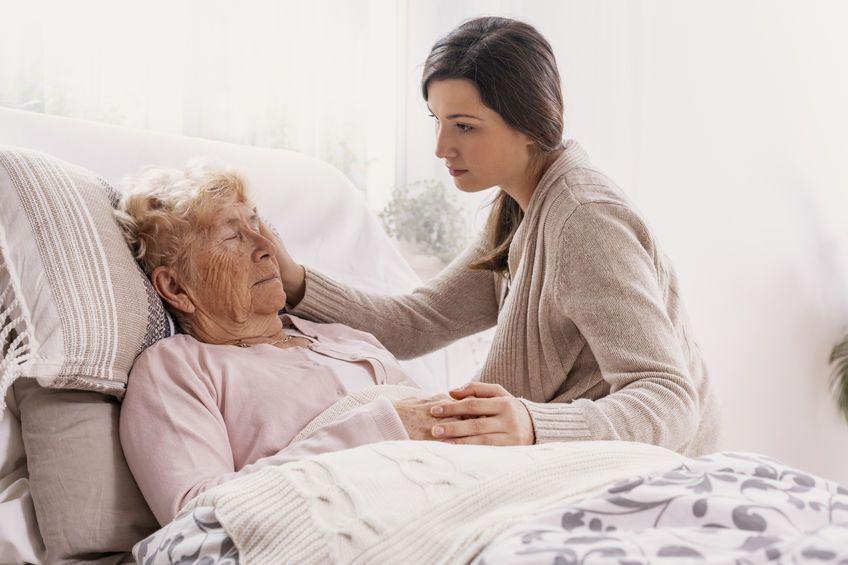It happened so fast.
My grandmother had a simple urinary tract infection, nothing out of the ordinary for an elderly patient. She was in the hospital for a few days to receive medication and was sent home in great spirits. She had a solid Friday- Granny was up and talking, she loved on her cats, slept in her bed, and, while she was not 100%, she was happy to be home.
Not even 24 hours later we were calling for an ambulance. In a matter of one night, she had gone from our cheerful and chatty grandmother to an almost total vegetative state. We feared the worst- did she have a stroke in the middle of the night? Was the UTI back with a vengeance? How did this come on so quickly when just 1 day ago, she was doing so well?
Finding Answers
What started as a simple UTI turned into a week of discussions with doctors, a lot of guesswork, and not a lot of firm answers regarding WHAT was going on, let alone expectations for her future and ours.
Honestly, it was the most draining week of my family’s life.
We knew she wasn’t coming back. She couldn’t talk, saw straight through us with no recognition of who we were, she couldn’t swallow even a tiny bit of water, but we didn’t have any sort of timeline to help guide us through the steps that needed to be taken. Without a diagnosis, we couldn’t get approved for Hospice. We were nearing the end of what could be done for her in the hospital but we also knew we didn’t have enough answers to care for her at home. That left only a few alternatives- most revolving around a nursing home. We wanted to spend what little time we had left making her comfortable and being near her and that just didn’t seem like that was the right fit for us.
Getting The Guidance You Need
No matter how old a loved one gets, you are never really prepared for what end-of-life care entails. For us, even with having grown up in the industry- we were still at a loss for how to help her, how to ensure that she was receiving the care that she deserved while also keeping in line with her wishes.
Thankfully, palliative care stepped in and helped guide us. Within 24 hours of sitting with a care specialist and discussing our needs and wants for Granny, we had a plan in place to start running more specialized tests. They listened to our grievances, they stopped by multiple times a day to check in not just on her, but on us as well, and one nurse even held my hand and hugged me as I cried in frustration and exhaustion.
To say that the more specialized attention was what helped push us in the right direction would be nothing short of an understatement. By the end of that week, not only did we have a diagnosis thanks to the palliative care team guiding her care process, but those diagnoses were what allowed us to transition her into hospice and ultimately bring her home.
The first day she was home, in her room with her family and her cats is a day our family will not forget. It was like the veil was lifted, her spirit was at home and her body was at ease in the comfort of her home. There were two good days with our sweet Granny- days where she recognized family, was able to communicate some, and most importantly two days where she was able to receive love and know that we were going to be ok.
She passed peacefully in her bed a few days after being sent home to hospice.
What a comfort it was to know that she was surrounded by all the things and people she loved. All you hope for with a loved one is a full life and a quiet passing, we were lucky enough to have been able to give her that final send-off- all thanks to palliative care.
So what is Palliative Care?
Palliative care is specialized medical care for people living with a serious illness. This type of care is focused on providing relief from the symptoms and stress of the illness to improve the quality of life for both the patient and the family.
Does this seem similar to what you know of hospice? That is because both palliative care and hospice care have goals of providing comfort, however, palliative care can begin at diagnosis (and even help with the process of diagnosing) and also through the treatment process while hospice care begins after treatments have stopped and end of life is near.
Many patients begin with palliative care as a stepping stone for hospice, however, you do not need to be actively dying for palliative care to be considered for you or a loved one. The main goal is to help those in a chronic state live a more meaningful and full life.
Is Palliative Care Right for You?
For us, the answer was yes- absolutely. The Palliative Care Team stepped in and helped make our time dealing with the healthcare system less stressful and traumatic. In my opinion, their efforts as a team helped us get Granny out of the hospital and allowed what everyone hopes to give their loved ones at the end of life- a bit of dignity and a lot of comfort.
I don’t think there is any better way to say I love you than that.

